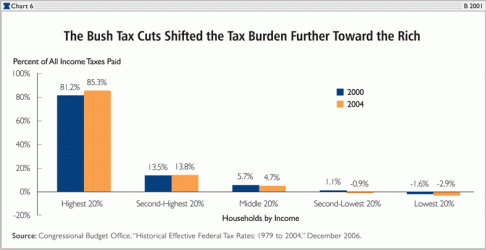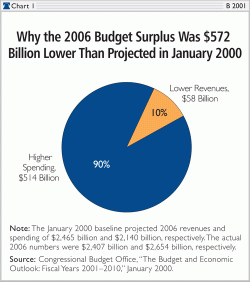jreeves
Senior Member
- Feb 12, 2008
- 6,588
- 319
- 48
Ten Myths About the Bush Tax Cuts
The Democratic majority in the U.S. House of Rep*resentatives must decide whether to write a budget extending, expiring, or repealing the Bush tax cuts. These tax cuts have provided a convenient scapegoat for the nation's budget and economic challenges. Despite a 42 percent spending increase in 2001, critics charge that the tax cuts have starved popular pro*grams. Despite surging economic growth and 5 million new jobs since 2003, critics also charge that the tax cuts have not helped the economy. Finally, despite making the income tax code more progressive, critics charge that the tax cuts have widened inequality.
Nearly all of the conventional wisdom about the Bush tax cuts is wrong. In reality:
The tax cuts have not substantially reduced cur*rent tax revenues, which were in fact not far from the 2000 pre–tax cut baseline and over the 2003 pre–tax cut baseline in 2006;
The increased child tax credit, 10 percent tax bracket, and fix of the alternative minimum tax (AMT) reduced tax revenues much more than most of the "tax cuts for the rich";
Economic growth rates have more than doubled since the 2003 tax cuts; and
The tax cuts shifted even more of the income tax burden toward the rich.
Setting optimal tax policy requires governing with facts rather than popular mythology, which is why it is important to set the record straight by debunking 10 myths about the Bush tax cuts.
Ten Myths About the Bush Tax Cuts—and the Facts
Myth #1: Tax revenues remain low.
Fact: Tax revenues are above the historical average, even after the tax cuts.
Myth #2: The Bush tax cuts substantially reduced 2006 revenues and expanded the budget deficit.
Fact: Nearly all of the 2006 budget deficit resulted from additional spending above the baseline.
Myth #3: Supply-side economics assumes that all tax cuts immediately pay for themselves.
Fact: It assumes replenishment of some but not necessarily all lost revenues.
Myth #4: Capital gains tax cuts do not pay for themselves.
Fact: Capital gains tax revenues doubled following the 2003 tax cut.
Myth #5: The Bush tax cuts are to blame for the projected long-term budget deficits.
Fact: Projections show that entitlement costs will dwarf the projected large revenue increases.
Myth #6: Raising tax rates is the best way to raise revenue.
Fact: Tax revenues correlate with economic growth, not tax rates.
Myth #7: Reversing the upper-income tax cuts would raise substantial revenues.
Fact: The low-income tax cuts reduced revenues the most.
Myth #8: Tax cuts help the economy by "putting money in people's pockets."
Fact: Pro-growth tax cuts support incentives for productive behavior.
Myth #9: The Bush tax cuts have not helped the economy.
Fact: The economy responded strongly to the 2003 tax cuts.
Myth #10: The Bush tax cuts were tilted toward the rich.
Fact: The rich are now shouldering even more of the income tax burden.
In fact, "Bush's" tax cuts increased tax revenues....go figure
The Democratic majority in the U.S. House of Rep*resentatives must decide whether to write a budget extending, expiring, or repealing the Bush tax cuts. These tax cuts have provided a convenient scapegoat for the nation's budget and economic challenges. Despite a 42 percent spending increase in 2001, critics charge that the tax cuts have starved popular pro*grams. Despite surging economic growth and 5 million new jobs since 2003, critics also charge that the tax cuts have not helped the economy. Finally, despite making the income tax code more progressive, critics charge that the tax cuts have widened inequality.
Nearly all of the conventional wisdom about the Bush tax cuts is wrong. In reality:
The tax cuts have not substantially reduced cur*rent tax revenues, which were in fact not far from the 2000 pre–tax cut baseline and over the 2003 pre–tax cut baseline in 2006;
The increased child tax credit, 10 percent tax bracket, and fix of the alternative minimum tax (AMT) reduced tax revenues much more than most of the "tax cuts for the rich";
Economic growth rates have more than doubled since the 2003 tax cuts; and
The tax cuts shifted even more of the income tax burden toward the rich.
Setting optimal tax policy requires governing with facts rather than popular mythology, which is why it is important to set the record straight by debunking 10 myths about the Bush tax cuts.
Ten Myths About the Bush Tax Cuts—and the Facts
Myth #1: Tax revenues remain low.
Fact: Tax revenues are above the historical average, even after the tax cuts.
Myth #2: The Bush tax cuts substantially reduced 2006 revenues and expanded the budget deficit.
Fact: Nearly all of the 2006 budget deficit resulted from additional spending above the baseline.
Myth #3: Supply-side economics assumes that all tax cuts immediately pay for themselves.
Fact: It assumes replenishment of some but not necessarily all lost revenues.
Myth #4: Capital gains tax cuts do not pay for themselves.
Fact: Capital gains tax revenues doubled following the 2003 tax cut.
Myth #5: The Bush tax cuts are to blame for the projected long-term budget deficits.
Fact: Projections show that entitlement costs will dwarf the projected large revenue increases.
Myth #6: Raising tax rates is the best way to raise revenue.
Fact: Tax revenues correlate with economic growth, not tax rates.
Myth #7: Reversing the upper-income tax cuts would raise substantial revenues.
Fact: The low-income tax cuts reduced revenues the most.
Myth #8: Tax cuts help the economy by "putting money in people's pockets."
Fact: Pro-growth tax cuts support incentives for productive behavior.
Myth #9: The Bush tax cuts have not helped the economy.
Fact: The economy responded strongly to the 2003 tax cuts.
Myth #10: The Bush tax cuts were tilted toward the rich.
Fact: The rich are now shouldering even more of the income tax burden.
In fact, "Bush's" tax cuts increased tax revenues....go figure
Last edited:
 Your a broken record tonight aren't you. I would do that too, if all I had to rely on were lies. Again, the Democratic Congress passed and appropriated every single dollar of debt under the Reagan Presidency.
Your a broken record tonight aren't you. I would do that too, if all I had to rely on were lies. Again, the Democratic Congress passed and appropriated every single dollar of debt under the Reagan Presidency.
